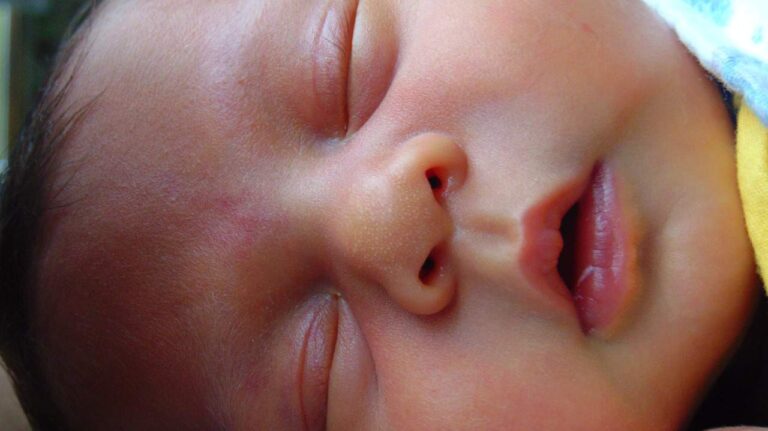My Newborn’s Stomach is Gurgling and Passing Gas. Is That Normal?
Have you ever passed gas when you least expect it? Maybe you were on a date when you suddenly felt a strong gust from your trousers. Or you were at a meeting when you accidentally let one rip while your boss was talking.
As embarrassing as it is, passing gas is a natural part of digestion. A person farts 5 to 15 a day, some going beyond that estimate. And sometimes, food or medical conditions make you fart more than usual.
Farting can be traced back all the way to our infancy. It might catch you off-guard when you hear a baby fart for the first time. But farting is not the only sign of an active digestive system.
You might notice other signs, too, like a gurgling stomach. But when is a gurgling tummy a sign of something wrong? And what can you do to keep your baby from having an upset belly?
My Newborn’s Stomach is Gurgling. Is That Normal?
Parents deal with lots of weird noises and behaviors coming from their kids. A gurgling stomach is just one of those sounds your baby makes every now and then. And in most cases, those sounds are normal and will go away on their own.
But where are those sounds coming from? Look no further than in your infant’s guts. Your baby’s digestive system is busy digesting nutrients, so all that movement in their stomach and intestine produces noise. We also hear these noises when we press our heads against an adult’s stomach.
Let’s also go back to our previous point above. Your baby’s stomach might be making noise because gas is rolling inside it. Gas can create rumbling inside the guts, and usually, the only way out is either through burping or farting.
A growling stomach is nothing to be worried about. In fact, you should be more concerned if you hear nothing in your baby’s belly. When it comes to digestive problems, more concerning signs should pop up. (More on that later.)
Where is All That Gas Coming From?
It is clear that gas is a culprit for a grumbly tummy. But where is all that gas coming from? There are different reasons why your baby is passing gas. Some common causes include:
Their Digestive Tract is Still Growing
Your baby is developing every day, so there will be changes in their bodily functions. An immature digestive tract will more likely produce gurgling sounds and pass gas.
They are Swallowing Air While Eating or Crying
Another plausible reason why your baby is passing gas is air. More specifically, air travels from their mouth and digestive tract, making them gassier. Air can enter your infant either while they are eating or crying.
Air can enter a baby’s mouth while they are being nursed. A poor latch or feeding position can push air into your baby.
Likewise, every time your baby opens their mouth to cry, air can get sucked into their mouth. And because of the excess air, you bet your kid will feel bloated for a while. So watch out because more gas might make your infant cry harder!
They are Trying Out New Food
This last reason is reserved for older infants. But babies might be gassy as a response to a new solid food they are trying. However, frequently passing gas might be a sign of food sensitivity or allergies, so watch out for any triggers.
How Do I Reduce Gas in My Baby?
While gas is not dangerous to infants, it can make them uncomfortable, sometimes to the point of tears. You can soothe your infant’s upset tummy and let the gas out quickly through the following:
- Lie your infant on their back, raise their legs, and gently move them in circles like riding a bike. This circular motion can push out air quickly while providing a fun workout for your baby.
- Hold their head upright while getting them to burp. The upright position makes it easier for air to pass. Tapping their back can also help them push out their burps.
- Let your baby crawl on their tummy on the floor. Their position can help them release gas, strengthen their upper body muscles, and teach them to keep their head up.
- Find a distraction to keep your baby from thinking about their gassy tummy. Play games, dance to music, or read a book together. Your baby will pass gas without them even noticing!
- A gentle massage can also help your baby push out extra gas. Put some pressure on their tummy and rub your fingers in small circles. Just don’t press too hard!
If none of these methods are working, and your infant continues to cry and feel discomfort, something might be wrong. In some instances, a gassy and bloated stomach is a sign of an underlying problem.
When Should I Visit Our Pediatrician?
An upset, gassy stomach can be a symptom of a gastrointestinal problem. Besides gas, other symptoms like vomiting or diarrhea can be observed. In this case, your infant might be suffering from a gastrointestinal virus.
There are other possible reasons your baby is having an upsetting time with their tummy. Your infant might be suffering from constipation or acid reflux. Or maybe they are sensitive to their formula and have allergies.
Many newborns might also have episodes of prolonged crying. Colic has no defined cause, but many suggest that it might stem from sensitivity to gas. While there is a lack of solid evidence on whether gas causes colic, there is no harm in trying to reduce the amount of gas your infant pushes.
Whichever cause it may be, your pediatrician will be able to determine the cause and give you the appropriate action to take.
Conclusion
Infants make a lot of weird noises. One sound you will hear is their tummy gurgling on its own.
Thankfully, there is nothing to be worried about it. In most cases, your infant just needs to pass gas. There is nothing to fuss about. (Well, except for that nasty smell!)










